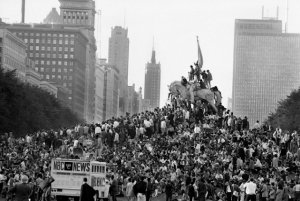Chicago: The Prague of the West
Saturday and Sunday, Czechs were gathering around the invading tanks and soldiers, asking “Why are you here?” The Russian invasion of Czechoslovakia to suppress the liberalization of Czech life was seized as an example by every faction in Chicago. Connally used it in his speech to the Platform Committee to show why we must give vigorous support to such efforts as the Vietnam War. Senator Ralph Yarborough of Texas, speaking for the Texas challengers before the Credentials Committee, asked the Committee not to crush the “idealism of the young” with “political power” the way the Russians crushed the Czechs with “military power.” Yippies and demonstrators felt the example of Czech bravery and began using words such as Czechoslocago and Prague East and Prague West. They were also alert for strong visual images of potential theatrical effect and they too gathered around the cops, saying, “Why are you here?” The cops, without a trace of Russian queasiness, said, “This is my job.
—from No One Was Killed by John Schultz
John Schultz, creator of the Story Workshop method and long-time head of the Fiction Writing department at Columbia College Chicago, died on May 6. Though he was known as an innovator in the teaching of fiction writing, his most well-known book, No One Was Killed, is a work of nonfiction, an eyewitness account of the action in the streets outside the 1968 Democratic Convention in Chicago, though those eyes were often closed by tear gas. In his foreword to the forty-year anniversary reprint, Todd Gitlin compares Schultz’s achievement to Norman Mailer’s Armies of the Night and George Orwell’s Homage to Catalonia insofar as they “bear the marks—the scars—of a writer striving to be honest about what he was doing in unaccustomed settings witnessing strange and remarkable things.”
The passage above is typical in that Schultz manages to bring together the global, the political, and the personal all in a single paragraph. Young people may have been in the streets of Prague and Paris and dozens of college campuses across the country, but for the rank and file Chicago street cop, it was just another—albeit violent—day at the office. This sort of new journalism also reflected Schultz’s notions of teaching creative writing, which he felt was best taught outside college classrooms and “developed in a living relationship with whatever kind of life events, careers, were going on for various people.”
Schultz taught for over forty years across the street from Grant Park, where the events of the book were recorded. At Punctuate, we would think that this democratic notion of writing (and the teaching of writing) informs our aesthetic, as well, and we remain grateful to John Schultz for his vision.
Ian Morris, Managing Editor

